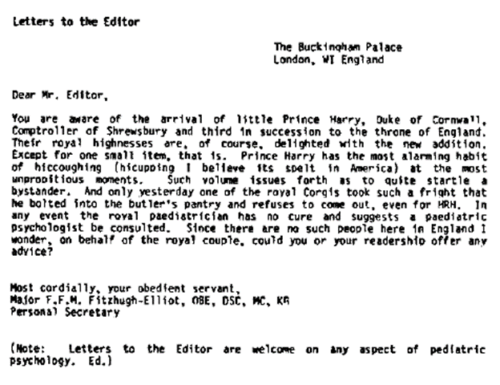HISTORY SPOTLIGHT: In Memoriam
Brian Stabler, Ph.D. (1944-2022)

SPP Officer and Contributor to Pediatric Psychology in Research in Children’s Chronic Illness and Professional Consultation
By Michael C. Roberts, Ph.D., ABPP
Society of Pediatric Psychology Co-Historian
Brian Stabler, Ph.D. of the University of North Carolina, Chapel Hill, Department of Psychiatry at the medical center was an early contributor to science and clinical practice in pediatric psychology. He published research on psychological considerations for children with chronic conditions. His range of work included disorders in pediatric endocrinology and associated psychosocial issues, such as quality of life. His professional publications included books, chapters, and journal articles. Dr. Stabler often wrote and presented on professional issues of consultation, roles and functions of pediatric and health psychologists, training of psychologists and physicians, and program descriptions for clinical services for children with chronic illnesses.
Dr. Stabler served on the Board of Directors of the Society of Pediatric Psychology as a Member-at-Large (1983-85) and SPP Representative to Division 38 (Health Psychology). Also serving as the SPP Newsletter editor (1983-84), Stabler continued the tradition of producing a newsletter that was newsy and informative, useful to readers and the Society, and even fun. As he assumed the editorship, he wrote that he hoped it would be with “aplomb, joie de vie, and panache” (1983, 7(2), p. 1), while noting it was the first Anglo-American edition of the SPP Newsletter (because he emigrated from England to attend graduate school).
He and newsletter co-editor Annette La Greca subsequently noted: “George Christophe Litchtenberg once said, "‘A microphone is a mirror; if an ass talks into it you can't expect an apostle to talk out.’ And so it is with newsletters and the like, you get out what you put in, or thereabouts. . . . If it [this newsletter] is to be a ‘mirror’ of the sort that Lichtenberg spoke of then the more people speak through it, the better” (Stabler & La Greca, Editorial, 1984, 8(1), p. 1).
In addition to providing timely news of the field and organization, Dr. Stabler published a facetious letter from Buckingham Palace about the birth of Prince Harry and his hiccupping at the “most unpropitious moments.” Harry’s hiccupping frightened the Royal Corgis. Her Majesty’s personal secretary requested help from American pediatric psychologists (given that “there are no such people in England”; 1984, 8(3), p. 2). See Figure 1.
In another “Editor’s Choice” piece, he quoted from “the Immortal Bard, Scottish poet and philosopher, Robert Burns.” Noting that Burns wrote during “great political and social unrest” wishing for more critical self-analysis, Stabler argued that:
“Today the professional psychology [field] finds itself beset by turmoil, and change is happening all around us. Our own subspecialty is hardly immune from all of this. . . .Our identity is still not crystallized, nor is it likely to in the near future. . . The rich diversity represented in the backgrounds, workplaces and philosophical orientations of SPP's membership represents our single greatest strength. If only we could see ourselves as others are beginning to; how much more effectively we could go forward to our future” (1984, 8(2), pp. 1-2).
As an early contributor to the Journal of Pediatric Psychology (JPP), Stabler (1979) presented his view of “emerging models” of interdisciplinary consultation for the field. He outlined three consultation concepts of “Resource, Process, and Process-Educative Consultation” that are basic skills for pediatric psychology functioning. These concepts informed his work in the medical setting and scholarship. This included a chapter on “Consultation-Liaison” in the first edition of the Handbook of Pediatric Psychology (HPP; Stabler, 1988) and a chapter coauthored with Kim Hamlett in the second edition of HPP (Hamlett & Stabler, 1995). In the latter chapter, they noted important factors that affected the consultation process, including the way in which medical education is conducted and knowledge is structured, the medical culture, the language and differing case conceptualizations, the pressure of time inherent in medical settings, and various interaction patterns with caregivers, families, and patients.
Dr. Stabler and UNC colleague, Kenneth Whitt (also an officer in SPP) provided a case example in an article in JPP to illustrate the range of role demands placed on the pediatric psychologist providing services in a medical setting (Stabler & Whitt, 1980). They noted the educational and training requirements for proper functioning included “basic training in clinical child psychology, child development, and in a broad range of psychometric assessment techniques” and “the ability to utilize consultation models of differing complexities” (p. 245).
Similarly, Brantley, Stabler, and Whitt (1981) in JPP wrote an early description of programmatic clinical services in a medical center to provide comprehensive care for children with chronic illness and their families. They described case consultation, liaison activities, and research as important aspects of psychology’s collaboration with medicine. Brantley et al. emphasized case consultation, in particular, for “understanding the overlooked phenomenon of successful adaptation of chronically ill children and their families” (p. 229).
In a 1984 article published in Professional Psychology: Research and Practice, Dr. Stabler and Gary Mesibov (a UNC colleague and later SPP President) described various role functions of pediatric and health psychologists in health care settings. Their list derived from survey results of over 600 pediatric and health psychologists. Stabler and Mesibov found that there was “a wide range of diagnostic, treatment, and consultative activities in health care settings and that there are many similarities in the ways they conceptualize their roles and how they function” (p. 142).
Over time, Dr. Stabler’s research and clinical interests moved into clinical and research work with children who experienced growth delays and were treated with growth hormone therapy. Supported by pharmaceutical companies, he hosted scientific conferences drawing psychologists and medical researchers. He conducted empirical research into the psychological impact of growth deficiency and the utility of hormone replacement treatments in a series of articles and chapters (e.g., Frasier & Stabler, 2004; Grew, Stabler, Williams, & Underwood, 1983; Nicholas, Tancer, Silva, Underwood, & Stabler, 1997; Stabler, Clopper, Siegel, Stoppani, Compton, & Underwood, 1994; Stabler, Siegel, & Clopper, 1991).
He summarized this work in a chapter on the quality of life and psychological functioning of children with growth delays (Stabler & Frank, 1998) for Dennis Drotar’s book on measuring health-related quality of life. Stabler also published three edited books on the medical treatment and psychosocial considerations of children with short stature/ growth delays: Slow Grows the Child: Psychosocial Aspects of Growth Delay (Stabler & Underwood, 1986); Growth, Stature, and Adaptation: Behavioral, Social, and Cognitive Aspects of Growth Delay (Stabler & Underwood, 1994); Therapeutic Outcome of Endocrine Disorders; Efficacy, Innovation and Quality of Life (Stabler & Bercu, 2000). See Figure 2.
Additionally, Stabler co-edited a special issue of Health Psychology in 1986 (Volume 5, No. 3) presenting submitted articles on “Child Health Psychology.” Later, a compendium book entitled Child Health Psychology (1988) was published by Lawrence Erlbaum Associates reprinting those articles with overview commentary. See Figure 3.
Brian Stabler was born on September 2, 1944, and died on December 23, 2022. Coming to the United States from England in 1967 supported by a Rotary Club Scholarship, he earned a master’s degree in education (1968) and Ph.D. (1971) from University of North Carolina Chapel Hill. He retired as an Associate Professor in the Department of Psychiatry of the UNC School of Medicine.
Dr. Stabler wrote an informative and self-disclosive piece for the Journal of Pediatric Psychology (1993) on being the patient given his own experience as an adult undergoing experimental and intense chemotherapy for a rare form of cancer (which extended over a 30 year period). As his Chapel Hill obituary stated, he maintained his life “with grace, dignity and the most positive outlook ever” (https://www.legacy.com/us/obituaries/heraldsun/name/brian-stabler-obituary?id=38460218).
Dr. Stabler exhibited an early interest in film and videography, conducting one of the first examples of using videotaping for self-confrontation in training special educators in behavior management tools (Stabler & Frazier, 1973). This resourceful psychologist went on to create many more training films to teach medical students and residents on psychosocial issues of children. In the 1980s, he videotaped interviews with prominent pediatric psychologists. Unfortunately, only one of these remains currently accessible (with Dennis Drotar in 1985).
On his retirement from UNC, Dr. Stabler established a production company as a freelance filmmaker. His LinkedIn account revealed that PERSONAL PRODUCTIONS LLC “produces, writes, directs and delivers films regarding medical healthcare issues and specific conditions.” The company was described as “a small group media and documentary production team focusing on documentary film relating to issues of health and wellbeing, unique personalities who survive life altering experience, and the role of media in training physicians” (https://www.linkedin.com/in/brian-stabler-ph-d-8372657/).
As one example of the educational videos developed for physicians in training and in practice, the video for oncologists, If I Should Not Return “tells the story of two young fathers whose wives died of cancer and the impact this tragic loss has on the family. The value of a regular meeting with other fathers is shown and the question posed: what can healthcare workers offer to lessen the blow of losing a young wife and mother?” This video is available on YouTube: https://www.youtube.com/watch?v=raLN1sktUc4
Ken Whitt, Stabler’s colleague in the Department of Psychiatry and professor emeritus at UNC wrote:
“I remember well Brian’s enthusiasm for new technology, especially emerging visual aids, and clinical practice strategies… During the final decades of his life, Brian became a very accomplished videographer, among many other things documenting for health professionals the multiple insights he gained from coping with and adaptation to his own cancer, and the side effects of its treatment. A gregarious sort, Brian took great pride and enjoyment of his various personal collections ranging from art, home décor, beautiful plants, vehicles, natty attire, etc. Dr. Brian Stabler's enduring legacy is his broad, personal interest in helping others to help others. He had a penchant for influencing the evolution of support organizations with novel ideas. Not surprisingly, much of his focus derived from how chronic illness shaped his life, including his considerable investment in cancer support programs.”
William MacLean, retired professor from the University of Wyoming and retired from University of Wisconsin at Madison as a senior scientist, trained with Dr. Stabler at UNC, also noted:
“I met Brian when I was a pediatric psychology intern at the University of North Carolina – Chapel Hill in 1980-1981. Brian impressed me as an incredibly snappy dresser with a keen sense of humor and quick wit. He was a highly effective mentor for developing pediatric psychologists, like me, interested in the psychological aspects of childhood health conditions. Looking back now I realize that he had an obvious effect on the evolution of my research program in childhood chronic illness and my ability to build successful clinical and research collaborations with pediatric colleagues.”
The enduring legacy of Dr. Stabler in pediatric psychology will be through his contributions to the training of psychologists and physicians, in his influential conceptualization of consultation processes, and through his early building of the field’s knowledge base leading to treatment of children with chronic illnesses, especially children and adolescents of short-stature. Many in the field will have fond memories of his wit, “aplomb, joie de vie, and panache.”
Figure 1. Society of Pediatric Psychology Newsletter (1984, Volume 8, Issue #3, p. 2)

Figure 2. Books on Children with Growth Delay and Treatments by Growth Hormones edited by
Brian Stabler



Figure 3. Co-edited book on Child Health Psychology in 1988, reprinting articles originally published in a special issue of Division 38’s Health Psychology journal in January 1986, Vol. 5, issue no. 3

Brian Stabler: List of Publications
Brantley, H. T., Stabler, B., & Whitt, J. K. (1981). Program considerations in comprehensive care of chronically ill children. Journal of Pediatric Psychology, 6(3), 229-237. doi:https://doi.org/10.1093/jpepsy/6.3.229
Feinberg, A. M., Stabler, B., & Coley, S. B. (1974). Electrically induced relaxation in systematic desensitization: A case note. Psychological Reports, 35(1), 75-78. doi:https://doi.org/10.2466/pr0.1974.35.1.75
Frasier, S. D., & Stabler, B. (2004). Parent requests growth hormone for child with idiopathic short stature. Journal of Developmental and Behavioral Pediatrics, 25(5), S79-S83. doi:https://doi.org/10.1097/00004703-200410001-00016
Grew, R. S., Stabler, B., Williams, R. W., & Underwood, L. E. (1983). Facilitating patient understanding in the treatment of growth delay. Clinical Pediatrics, 22(10), 685-690. doi:https://doi.org/10.1177/000992288302201003
Hamlett, K. W., & Stabler, B. (1995). The developmental progress of pediatric psychology consultation. In M. C. Roberts (Ed.), Handbook of pediatric psychology (2nd ed., pp. 39-54). New York: Guilford.
Lin, R. J., Cohen, A. G., Stabler, S. M., Devlin, S. M., Elko, T. A., Maloy, M. A., . . . Nelson, J. E. (2020). Characteristics and impact of post-transplant interdisciplinary palliative care consultation in older allogeneic hematopoietic cell transplant recipients. Journal of Palliative Medicine, 23(12), 1653-1657. doi:https://doi.org/10.1089/jpm.2019.0611
Melamed, B. G., Matthews, K. A., Routh, D. K., & Stabler, B. (1986). Introduction. Health Psychology, 5(3), 181-183. doi:https://doi.org/10.1037/h0090852
Melamed, B. G., Matthews, K. A., Routh, D. K., Stabler, B., & Schneiderman, N. (Eds.). (2013). Child health psychology. Mahwah, NJ: Lawrence Erlbaum Associates.
Newmark, C. S., Wheeler, D., Newmark, L., & Stabler, B. (1975). Test-induced anxiety with children. Journal of Personality Assessment, 39(4), 409-413. doi:https://doi.org/10.1207/s15327752jpa3904_15
Nicholas, L. M., Tancer, M. E., Silva, S. G., Underwood, L. E., & Stabler, B. (1997). Short stature, growth hormone deficiency, and social anxiety. Psychosomatic Medicine, 59(4), 372-375. doi:https://doi.org/10.1097/00006842-199707000-00006
Siegel, P. T., Clopper, R., & Stabler, B. (1998). The psychological consequences of Turner syndrome and review of the National Cooperative Growth Study psychological substudy. Pediatrics, 102(Supplement_3), 488-491.
Stabler, B. (1979). Emerging models of psychologist–pediatrician liaison. Journal of Pediatric Psychology, 4(3), 307-313. doi:https://doi.org/10.1093/jpepsy/4.3.307
Stabler, B. (1990). On the home front. Contemporary Psychology, 35(1), 57-58. doi:https://doi.org/10.1037/028173
Stabler, B. (1993). On the role of patient. Journal of Pediatric Psychology, 18(3), 301-312. doi:https://doi.org/10.1093/jpepsy/18.3.301
Stabler, B. (1988). Pediatric consultation-liaison. In D. K. Routh (Ed.), Handbook of pediatric psychology (pp. 538-566). New York: Guilford.
Stabler, B. (1987). Promoting prohealth behavior in young people: Some representative issues. In J. A. Blumenthal & D. C. McKee (Eds.), Applications in behavioral medicine and health psychology: A clinician's source book (pp. 325-360). Sarasota, FL: Professional Resource Exchange, Inc.
Stabler, B. (1986). Review of treating sexually abused children and their families. Psychotherapy: Theory, Research, Practice, Training, 23(3), 484-485. doi:https://doi.org/10.1037/h0085644
Stabler, B. (2002). Impact of growth hormone (GH) therapy on quality of life along the lifespan of GH-treated patients. Hormone Research, 56(Suppl. 1), 55-58.
Stabler, B., & Underwood, L. E. (Eds.). (1986). Slow Grows the Child: Psychosocial Aspects of Growth Delay. Mahwah, NJ: Lawrence Erlbaum Associates.
Stabler, B., & Underwood, L. E. (Eds.). (1994). Growth, Stature, and Adaptation: Behavioral, Social, and Cognitive Aspects of Growth Delay. Chapel Hill, NC: Chapel Hill Press, University of North Carolina.
Stabler, B., & Bercu, B.B. (Eds.). (2000). Therapeutic Outcome of Endocrine Disorders. Serono Symposia USA. New York: Springer. https://doi.org/10.1007/978-1-4612-1230-0_11
Stabler, B., Clopper, R. R., Siegel, P. T., Nicholas, L. M., Silva, S. G., Tancer, M. E., & Underwood, L. E. (1996). Links between growth hormone deficiency, adaptation and social phobia. Hormone Research in Paediatrics, 45(1-2), 30-33.
Stabler, B., Clopper, R. R., Siegel, P. T., Stoppani, C., Compton, P. G., & Underwood, L. E. (1994). Academic achievement and psychological adjustment in short children. Journal of Developmental and Behavioral Pediatrics, 15(1), 1-6. doi:https://doi.org/10.1097/00004703-199402000-00001
Stabler, B., & Frank, N. C. (1998). Quality of life and the psychiatric status of individuals treated with GH in childhood. In D. Drotar (Ed.), Measuring health-related quality of life in children and adolescents: Implications for research and practice (pp. 273-286). Mahwah, NJ: Lawrence Erlbaum Associates Publishers.
Stabler, B., & Frazier, J. R. (1973). The use of video tape self-confrontation in the acquisition of behavior management skills by elementary special education trainees. Bulletin of the North Carolina Psychological Association, 12-18.
Stabler, B., Gibson, F. W., Jr., & Cutting, D. S. (1973). Parents as therapists: An innovative community-based model. Professional Psychology, 4(4), 397-402. doi:https://doi.org/10.1037/h0021438
Stabler, B., Gibson, F. W., Cutting, D. S., & Lawrence, P. S. (1974). Zone planning for accelerating adaptive behavior in the retarded. Exceptional Children, 40(4), 252-257.
Stabler, B., & Mesibov, G. B. (1984). Role functions of pediatric and health psychologists in health care settings. Professional Psychology: Research and Practice, 15(2), 142-151. doi:https://doi.org/10.1037/0735-7028.15.2.142
Stabler, B., Siegel, P. T., & Clopper, R. R. (1991). Growth hormone deficiency in children has psychological and educational co-morbidity. Clinical Pediatrics, 30(3), 156-160. doi:https://doi.org/10.1177/000992289103000304
Stabler, B., Surwit, R. S., Lane, J. D., Morris, M. A., Litton, J., & Feinglos, M. N. (1987). Type A behavior pattern and blood glucose control in diabetic children. Psychosomatic Medicine, 49(3), 313-316. doi:https://doi.org/10.1097/00006842-198705000-00010
Stabler, B., Turner, J. R., Girdler, S. S., Light, K. C., & Underwood, L. E. (1992). Reactivity to stress and psychological adjustment in adults with pituitary insufficiency. Clinical Endocrinology, 36(5), 467-473.
Stabler, B., & Warren, A. B. (1974). Behavioral contracting in treating trichotillomania: Case note. Psychological Reports, 34(2), 401-402. doi:https://doi.org/10.2466/pr0.1974.34.2.401
Stabler, B., & Whitt, J. K. (1980). Pediatric psychology: Perspectives and training implications. Journal of Pediatric Psychology, 5(3), 245-251. doi:https://doi.org/10.1093/jpepsy/5.3.245
Stabler, B., Whitt, J. K., Moreault, D. M., D'ercole, A. J., & Underwood, L. E. (1980). Social judgments by children of short stature. Psychological Reports, 46(3), 743-746. doi:https://doi.org/10.2466/pr0.1980.46.3.743
Stein, M. T., Frasier, S. D., & Stabler, B. (2004). Parent requests growth hormone for child with idiopathic short stature. Journal of Developmental and Behavioral Pediatrics, 25(2), 105-109. doi:https://doi.org/10.1097/00004703-200404000-00006
